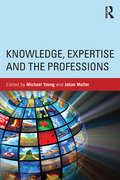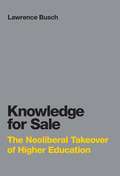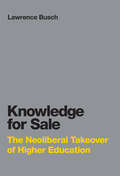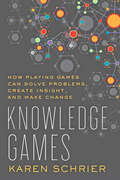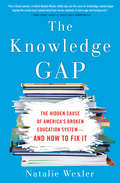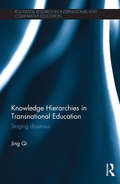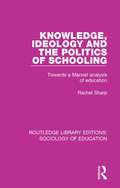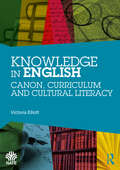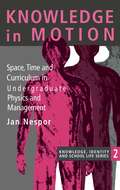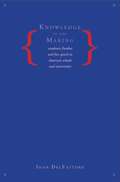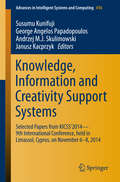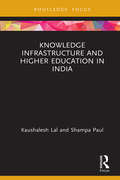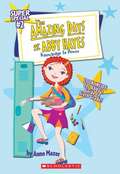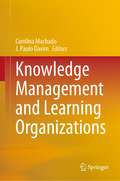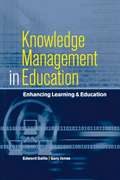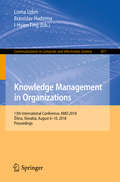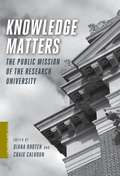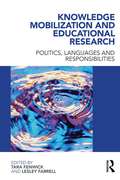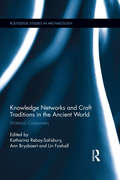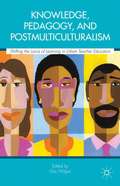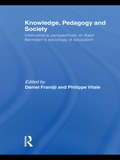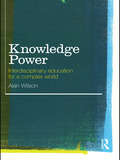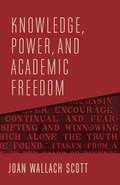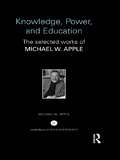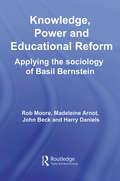- Table View
- List View
Knowledge, Expertise and the Professions
by Michael Young Johan MullerIt has long been recognised that specialised knowledge is at the core of what distinguishes professions from other occupations. The privileged status of professions in most countries, however, together with their claims to autonomy and access to specialised knowledge, is being increasingly challenged both by market pressures and by new instruments of accountability and regulation. Established and emerging professions are increasingly seen as either the solution, or as sources of conservatism and resistance to change in western economies, and recent developments in professional education draw on a competence model which emphasises what newly qualified members of a profession ‘can do’ rather than what ‘they know’. This book applies the disciplines of the sociology of knowledge and epistemology to the question of professional knowledge. What is this knowledge? It goes beyond traditional debates between ‘knowing how’ and ’knowing that’, and ‘theory’ and ‘practice’. The chapters cover a wide range of issues, from discussions of the threats to the knowledge base of established professions including engineers and architects, to the fraught situations faced by occupations whose fragile knowledge base and professional status is increasingly challenged by new forms of control. While recognising that graduates seeking employment as members of a profession need to show their capabilities, the book argues for reversing the trend that blurs or collapses the skill/knowledge distinction. If professions are to have a future then specialised knowledge is going to be more important than ever before. Knowledge, Expertise and the Professions will be key reading for students, researchers and academics in the fields of professional expertise, further education, higher education, the sociology of education, and the sociology of the professions.
The Knowledge for Sale: The Neoliberal Takeover of Higher Education
by Lawrence BuschA new philosophy of higher education has taken hold in institutions around the world. Its supporters disavow the pursuit of knowledge for its own sake and argue that the only knowledge worth pursuing is that with more or less immediate market value. Every other kind of learning is downgraded, its budget cut. In Knowledge for Sale, Lawrence Busch challenges this market-driven approach.The rationale for the current thinking, Busch explains, comes from neoliberal economics, which calls for reorganizing society around the needs of the market. The market-influenced changes to higher education include shifting the cost of education from the state to the individual, turning education from a public good to a private good subject to consumer demand; redefining higher education as a search for the highest-paying job; and turning scholarly research into a competition based on metrics including number of citations and value of grants. Students, administrators, and scholars have begun to think of themselves as economic actors rather than seekers of knowledge.Arguing for active resistance to this takeover, Busch urges us to burst the neoliberal bubble, to imagine a future not dictated by the market, a future in which there is a more educated citizenry and in which the old dichotomies -- market and state, nature and culture, and equality and liberty -- break down. In this future, universities value learning and not training, scholarship grapples with society's most pressing problems rather than quick fixes for corporate interests, and democracy is enriched by its educated and engaged citizens.
Knowledge for Sale: The Neoliberal Takeover of Higher Education (Infrastructures)
by Lawrence BuschHow free-market fundamentalists have shifted the focus of higher education to competition, metrics, consumer demand, and return on investment, and why we should change this.A new philosophy of higher education has taken hold in institutions around the world. Its supporters disavow the pursuit of knowledge for its own sake and argue that the only knowledge worth pursuing is that with more or less immediate market value. Every other kind of learning is downgraded, its budget cut. In Knowledge for Sale, Lawrence Busch challenges this market-driven approach.The rationale for the current thinking, Busch explains, comes from neoliberal economics, which calls for reorganizing society around the needs of the market. The market-influenced changes to higher education include shifting the cost of education from the state to the individual, turning education from a public good to a private good subject to consumer demand; redefining higher education as a search for the highest-paying job; and turning scholarly research into a competition based on metrics including number of citations and value of grants. Students, administrators, and scholars have begun to think of themselves as economic actors rather than seekers of knowledge.Arguing for active resistance to this takeover, Busch urges us to burst the neoliberal bubble, to imagine a future not dictated by the market, a future in which there is a more educated citizenry and in which the old dichotomies—market and state, nature and culture, and equality and liberty—break down. In this future, universities value learning and not training, scholarship grapples with society's most pressing problems rather than quick fixes for corporate interests, and democracy is enriched by its educated and engaged citizens.
Knowledge Games: How Playing Games Can Solve Problems, Create Insight, and Make Change (Tech.edu: A Hopkins Series on Education and Technology)
by Karen SchrierAre games the knowledge-producers of the future?Imagine if new knowledge and insights came not just from research centers, think tanks, and universities but also from games, of all things. Video games have been viewed as causing social problems, but what if they actually helped solve them? This question drives Karen Schrier’s Knowledge Games, which seeks to uncover the potentials and pitfalls of using games to make discoveries, solve real-world problems, and better understand our world. For example, so-called knowledge games—such as Foldit, a protein-folding puzzle game, SchoolLife, which crowdsources bullying interventions, and Reverse the Odds, in which mobile game players analyze breast cancer data—are already being used by researchers to gain scientific, psychological, and humanistic insights.Schrier argues that knowledge games are potentially powerful because of their ability to motivate a crowd of problem solvers within a dynamic system while also tapping into the innovative data processing and computational abilities of games. In the near future, Schrier asserts, knowledge games may be created to understand and predict voting behavior, climate concerns, historical perspectives, online harassment, susceptibility to depression, or optimal advertising strategies, among other things.In addition to investigating the intersection of games, problem solving, and crowdsourcing, Schrier examines what happens when knowledge emerges from games and game players rather than scientists, professionals, and researchers. This accessible book also critiques the limits and implications of games and considers how they may redefine what it means to produce knowledge, to play, to educate, and to be a citizen.
The Knowledge Gap: The hidden cause of America's broken education system--and how to fix it
by Natalie WexlerThe untold story of the root cause of America's education crisis--and the seemingly endless cycle of multigenerational poverty.It was only after years within the education reform movement that Natalie Wexler stumbled across a hidden explanation for our country's frustrating lack of progress when it comes to providing every child with a quality education. The problem wasn't one of the usual scapegoats: lazy teachers, shoddy facilities, lack of accountability. It was something no one was talking about: the elementary school curriculum's intense focus on decontextualized reading comprehension "skills" at the expense of actual knowledge. In the tradition of Dale Russakoff's The Prize and Dana Goldstein's The Teacher Wars, Wexler brings together history, research, and compelling characters to pull back the curtain on this fundamental flaw in our education system--one that fellow reformers, journalists, and policymakers have long overlooked, and of which the general public, including many parents, remains unaware. But The Knowledge Gap isn't just a story of what schools have gotten so wrong--it also follows innovative educators who are in the process of shedding their deeply ingrained habits, and describes the rewards that have come along: students who are not only excited to learn but are also acquiring the knowledge and vocabulary that will enable them to succeed. If we truly want to fix our education system and unlock the potential of our neediest children, we have no choice but to pay attention.
Knowledge Hierarchies in Transnational Education: Staging dissensus (Routledge Research in International and Comparative Education)
by Jing QiTransnational education seeks equivalence in standards and/or relevance of outcomes through the transfer of Western theories, concepts and methods. Utilising a critique-interpretative approach, Jing Qi argues that equivalence/relevance-oriented approaches to transnational education assume the legitimacy of the global knowledge hierarchy. Euro-American educational theories are imposed as defaults in non-Western educational communities of imagined consensus. Grounded in a study of a five-year transnational teacher education and community capacity-building program in Northern Chile, the book investigates the relationships between theoretical knowledge, knowledge hierarchies and critique. Transnational education communities are recognised as sites of critiques where conflictual and conceptual ‘dissensus’ disrupts global and local knowledge hierarchies. Critique is deployed by educational actors in their everyday engagement in transnational education to stage dissensus, which constantly re-draws the lines of possibility for knowledge co-construction. A matrix mapping system is designed to chart and theorise the Chilean educational actors’ critiques along the trail of concept translation, learning, application and innovation of knowledge hierarchies, which operate at and across global, transnational, local and the newly-created local-global levels. This book examines how these critiques modulate the ascendancy of knowledge hierarchies to enfranchise non-western educational actors for theoretical knowledge production that addresses local needs. Knowledge Hierarchies in Transnational Education will be of key value to researchers, academics and postgraduate students in the fields of international education, teacher education and globalisation.
Knowledge, Ideology and the Politics of Schooling: Towards a Marxist analysis of education (Routledge Library Editions: Sociology of Education #50)
by Rachel SharpFirst published in 1980, this book argues that a theory of ideology is essential to a theory of education. It relates developments in the Marxist theory of ideology to the analysis of schooling in a capitalist society. Beginning with an appraisal of the early twentieth century liberal social theorists, including Weber, Durkheim, Veblen and Mannheim, it demonstrates that the weakness of their approaches arose from a failure to comprehend adequately the nature of capitalism. It then outlines the state of the theory of ideology at the time and applies the concept in an analysis of contemporary schooling, concluding with a discussion of its political implications. The application of the theory of ideology offers important possibilities for a radical socialist strategy on education.
Knowledge in English: Canon, Curriculum and Cultural Literacy (National Association for the Teaching of English (NATE))
by Victoria ElliottFocusing on a key area of debate within the world of secondary English, the ‘knowledge-based curriculum’, this book explores in detail the question of knowledge in the teaching of English in secondary schools, drawing on specific concrete cases and a range of academic theories. Knowledge in English also investigates how to teach both facts and skills through the required texts to produce a balanced educational experience. Elliott brings together classic texts with contemporary knowledge and viewpoints to critically examine teaching in the English literature classroom, and situates them within the broader cultural and political context. The book includes discussions on race and gender in texts, Shakespeare and his influence, facts and emotions in poetry, and reading experiences. Knowledge in English is a foundational and accessible guide for researchers, practitioners, teacher educators and teachers around the world. It is a valuable resource for those involved in the English curriculum to keep the subject relevant and useful to students in the contemporary classroom.
Knowledge In Motion: Space, Time And Curriculum In Undergraduate Physics And Management
by Jan NesporUsing an analysis of learning by a case study comparison of two undergraduate courses at a United States University, Nespor examines the way in which education and power merge in physics and management. Through this study of politics and practices of knowledge, he explains how students, once accepted on these courses, are facilitated on a path to power; physics and management being core disciplines in modern society. Taking strands from constructivist psychology, post-modern geography, actor-network theory and feminist sociology, this book develops a theoretical language for analysing the production and use of knowledge. He puts forward the idea that learning, usually viewed as a process of individual minds and groups in face-to-face interaction, is actually a process of activities organised across space and time and how organisations of space and time are produced in social practice.; Within this context educational courses are viewed as networks of a larger whole, and individual courses are points in the network which link a wider relationship by way of texts, tasks and social practices intersecting with them. The book shows how students enrolled on such courses automatically become part of a network of power and knowledge.
Knowledge in the Making: Academic Freedom and Free Speech in America's Schools and Universities
by Joan DelfattoreHow free are students and teachers to express unpopular ideas in public schools and universities? Not free enough, Joan DelFattore suggests. Wading without hesitation into some of the most contentious issues of our times, she investigates battles over a wide range of topics that have fractured school and university communities--homosexuality-themed children's books, research on race-based intelligence, the teaching of evolution, the regulation of hate speech, and more--and with her usual evenhanded approach offers insights supported by theory and by practical expertise. Two key questions arise: What ideas should schools and universities teach? And what rights do teachers and students have to disagree with those ideas? The answers are not the same for K-12 schools as they are for public universities. But far from drawing a bright line between them, DelFattore suggests that we must consider public education as a whole to determine how--and how successfully--it deals with conflicting views. When expert opinion clashes with popular belief, which should prevail? How much independence should K-12 teachers have? How do we foster the cutting-edge research that makes America a world leader in higher education? What are the free-speech rights of students? This uniquely accessible and balanced discussion deserves the full attention of everyone concerned with academic goals and agendas in our schools.
Knowledge, Information and Creativity Support Systems
by Susumu Kunifuji George Angelos Papadopoulos Andrzej M. J. Skulimowski Janusz KacprzykThisvolume consists of a number of selected papers thatwere presented at the 9th International Conference on Knowledge, Informationand Creativity Support Systems (KICSS 2014) in Limassol, Cyprus, after theywere substantially revised and extended. The 26 regularpapers and 19 short papers included in this proceedings cover all aspects ofknowledge management, knowledge engineering, intelligent information systems,and creativity in an information technology context, including computationalcreativity and its cognitive and collaborative aspects.
Knowledge Infrastructure and Higher Education in India (Routledge Focus on Economics and Finance)
by Kaushalesh Lal Shampa PaulThis short book examines the availability and adoption of new education technologies in higher education institutions in India. It provides a summary of the activities in which such technologies are being used and the catalytic factors for such adoptions. The book also evaluates the impact on skill development, and will be a useful reference for those who are interested to find out more about technology adoption and implementation in higher education, and what the challenges are through the learning experiences in these education institutions.
Knowledge Is Power (The Amazing Days of Abby Hayes Super Special #2)
by Anne MazerAbby's starting sixth grade at last! She thinks she's ready for anything, until she makes a mortifying mistake on her very first day. Will Abby manage to make it better? Or will one mistake follow her through the rest of middle school?
Knowledge Management and Learning Organizations
by Carolina Machado J. Paulo DavimThis book focuses on knowledge management and learning organizations, showing how they realise entrepreneurship and innovation. Understanding knowledge management as the process of creating, sharing and managing an organization’s information and knowledge, and focusing learning organizations in their collaborations to promote continuous learning are two issues that are critical to the organizational success. As such, this book offers insights into the topic and the appropriate use of the tools and strategies that drive competitive organizations operating on an international or transnational scale.
Knowledge Management in Education: Enhancing Learning & Education
by Gary Jones Edward SallisKnowledge Management (KM) is the technique of using the information and knowledge that is supplied to, generated by and inherent in any organization or institution, to improve its performance. This volume demonstrates how KM can be used in education to improve learning.
Knowledge Management in Organizations: 13th International Conference, KMO 2018, Žilina, Slovakia, August 6–10, 2018, Proceedings (Communications in Computer and Information Science #877)
by Lorna Uden Branislav Hadzima I-Hsien TingThis book contains the refereed proceedings of the 13th International Conference on Knowledge Management in Organizations, KMO 2018, held in Žilina, Slovakia, in August 2018. The theme of the conference was "Emerging Research for Knowledge Management in Organizations."The 59 papers accepted for KMO 2018 were selected from 141 submissions and are organized in topical sections on: Knowledge management models and analysis; knowledge sharing; knowledge transfer and learning; knowledge and service innovation; knowledge creation; knowledge and organization; information systems and information science; knowledge and technology management; data mining and intelligent science; business and customer relationship management; big data and IoT; and new trends in IT.
Knowledge Matters: The Public Mission of the Research University (A Columbia / SSRC Book)
by Diana Rhoten Craig CalhounHigher education can be a vital public good, providing opportunities for students, informed citizens for democracy, and knowledge to improve the human condition. Yet public investment in universities is widely being cut, often because public purposes are neglected while private benefits dominate. In this collection, international scholars confront the realities of higher education and the future of its public and private agenda. Their perspectives illuminate the trajectory of education in the twenty-first century and the continuing importance of the university's public mission. Reporting from Asia, Africa, Europe, Latin America, and North America, these scholars look at the different ways universities struggle to serve public and private agendas. Contributors examine the implications of changes in funding sources as well as amounts, different administrative and policy decisions, and the significance of various approaches to assessment and evaluation. They ask whether wider student access has in fact resulted in social mobility, whether more scientific research can be treated as an open-access resource, how changes in academic publishing change access to knowledge, and whether universities get full value from research sold to private corporations. At the same time, these chapters capture the confusion in the university sector over explaining academic work to a broader public and prioritizing its multiple purposes. Authors examine these practical challenges and the implications of different approaches in different contexts.
Knowledge Mobilization and Educational Research: Politics, languages and responsibilities
by Tara Fenwick Lesley FarrellHow can educational research have more impact? What processes of knowledge exchange are most effective for increasing the uses of research results? How can research-produced knowledge be better ‘mobilized’ among users such as practicing educators, policy makers, and the public communities? These sorts of questions are commanding urgent attention in educational discourses and research policies now circulating around the world. This attention has been translated into powerful material exercises that shape what is considered to be worthwhile research and how research is funded, recognized, and assessed. Yet precisely what activities constitute effective knowledge mobilization, or even what is meant by ‘moving knowledge’, remains unclear. What politics are at play in determining knowledge ‘impact’ across radically different contexts? Who determines what counts as impact, and for what purposes? How are ‘results’ of educational research separated from its participants and processes? In addition knowledge mobilization also invokes debates about the languages through which knowledge is constructed, policy processes are enacted, and research unfolds. This volume is unique in bringing together these wide-ranging issues of knowledge mobilization in education. The volume editors critically analyse these complex issues and also describe various efforts of knowledge mobilization and their effects. While the contributors themselves speak from diverse material, occupational and theoretical locations. Leading scholars in Canada, the US, the UK, and Australia bring disciplinary perspectives from law, digital media studies, museum studies, journalism and policy-making as well as fields of education. Some speak from Anglo-‘Western’ perspectives but others such as Phan Le Ha (Vietnamese), Rui Yang (Chinese) and Dolores van der Wey (Haida/West Coat Salish First Nations) speak from Asian, Indigenous and diasporic locations.
Knowledge Networks and Craft Traditions in the Ancient World: Material Crossovers (Routledge Studies in Archaeology)
by Lin Foxhall Katharina Rebay-Salisbury Ann BrysbaertThis edited volume investigates knowledge networks based on materials and associated technologies in Prehistoric Europe and the Classical Mediterranean. It emphasises the significance of material objects to the construction, maintenance, and collapse of networks of various forms – which are central to explanations of cultural contact and change. Focusing on the materiality of objects and on the way in which materials are used adds a multidimensional quality to networks. The properties, functions, and styles of different materials are intrinsically linked to the way in which knowledge flows and technologies are transmitted. Transmission of technologies from one craft to another is one of the main drivers of innovation, whilst sharing knowledge is enabled and limited by the extent of associated social networks in place. Archaeological research has often been limited to studying objects made of one particular material in depth, be it lithic materials, ceramics, textiles, glass, metal, wood or others. The knowledge flow and transfer between crafts that deal with different materials have often been overlooked. This book takes a fresh approach to the reconstruction of knowledge networks by integrating two or more craft traditions in each of its chapters. The authors, well-known experts and early career researchers, provide concise case studies that cover a wide range of materials. The scope of the book extends from networks of craft traditions to implications for society in a wider sense: materials, objects, and the technologies used to make and distribute them are interwoven with social meaning. People make objects, but objects make people – the materiality of objects shapes our understanding of the world and our place within it. In this book, objects are treated as clues to social networks of different sorts that can be contrasted and compared, both spatially and diachronically.
Knowledge, Pedagogy, and Postmulticulturalism
by Gay WilgusThis volume identifies, problematizes, and discusses issues specific to the design of educational programs for teacher candidates from working class, ethnic- and language-minority, and immigrant backgrounds, taking as its starting point the distinctive, complex perspectives that these candidates bring to the university classroom.
Knowledge, Pedagogy and Society: International Perspectives on Basil Bernstein's Sociology of Education
by Daniel FrandjiOver the course of the late-twentieth century Basil Bernstein pioneered an original approach to educational phenomena, taking seriously questions regarding the transmission, distribution and transformation of knowledge as no other before had done. Arguing tirelessly for change, more than any other British sociologist it is Bernstein who presents to us education as a social right and not as a privilege. It is this objective today that makes his work so important. Knowledge, Pedagogy and Society seeks to clarify the broad brushstrokes of his theories, developed over the span of more than forty years, by collecting together scholars from every corner of the globe; specialists in education, sociology and epistemology to test and examine Bernstein’s work against the backdrop of their own research. From teaching content and the social, cognitive and linguistic aspects of education, to changes in the political climate in the early twenty-first century, this collection represents an open dialogue with Bernstein’s work using a forward-looking and dynamic approach. Originally published in French with the explicit aim of locating Basil Bernstein’s theories alongside those of Pierre Bourdieu, one of the most important European sociologists, the French editors draw together a collection that offers a diverse background and perspective on Bernstein’s work and thought. Revised to include a new preface, a new introduction and revisited papers, the English edition will be a relevant resource for anyone interested in Bernstein, his reception and importance, as well as individuals working in the sociology of education, theory of education and education policy.
Knowledge Power: Interdisciplinary Education for a Complex World
by Alan WilsonSuccess in the twenty-first century demands knowledge power – for individuals, organisations, cities, regions and countries. This book offers a map showing the structure of the knowledge space in a contemporary context. The routes beyond traditional disciplines are charted, in part based on the notions of superconcepts and superproblems. There are major implications for the development of education systems, particularly for universities but also for all employers as they seek to ensure that their organisations have the requisite knowledge to meet future challenges. In many instances, radical change is called for. The traditional disciplines and their future development are reviewed and systems concepts are introduced to develop an interdisciplinary framework for the future. The nature of the knowledge core for different kinds of organisation is outlined in the context of development strategies and management capabilities. Super concepts are introduced throughout and through these the reader is introduced to a range of authors who, it is argued, provide the signposts for the way ahead.
Knowledge, Power, and Academic Freedom (The Wellek Library Lectures)
by Joan Wallach ScottAcademic freedom rests on a shared belief that the production of knowledge advances the common good. In an era of education budget cuts, wealthy donors intervening in university decisions, and right-wing groups threatening dissenters, scholars cannot expect that those in power will value their work. Can academic freedom survive in this environment—and must we rearticulate what academic freedom is in order to defend it?This book presents a series of essays by the renowned historian Joan Wallach Scott that explore the history and theory of free inquiry and its value today. Scott considers the contradictions in the concept of academic freedom. She examines the relationship between state power and higher education; the differences between the First Amendment right of free speech and the guarantee of academic freedom; and, in response to recent campus controversies, the politics of civility. The book concludes with an interview conducted by Bill Moyers in which Scott discusses the personal experiences that have informed her views. Academic freedom is an aspiration, Scott holds: its implementation always falls short of its promise, but it is essential as an ideal of ethical practice. Knowledge, Power, and Academic Freedom is both a nuanced reflection on the tensions within a cherished concept and a strong defense of the importance of critical scholarship to safeguard democracy against the anti-intellectualism of figures from Joseph McCarthy to Donald Trump.
Knowledge, Power, and Education: The Selected Works of Michael W. Apple
by Michael W. AppleFor more than three decades, Michael W. Apple has sought to uncover and articulate the connections among knowledge, teaching, and power in education. His germinal Ideology and Curriculum was a watershed title in critical education studies, and has remained in print since its publication in 1979. The more than two dozen books and hundreds of papers, articles, and chapters published since have likewise all contributed to a greater understanding of the relationship between and among the economy, political, and cultural power in society on the one hand "and the ways in which education is thought about, organized, and evaluated" on the other. In this collection, Apple brings together 13 of his key writings in one place, providing an overview not just of his own career, but of the larger development of the field. A new introduction re- examines the scope of his work and his earlier arguments, and reflects on what remains to be done for those committed to critical education.
Knowledge, Power and Educational Reform: Applying the Sociology of Basil Bernstein
by John Beck Harry Daniels Madeleine Arnot Rob MooreThis book is made up of a selection of writings from an international team of scholars, highlighting the contribution made to the field of educational policy and educational policy research by Basil Bernstein's work on the sociology of pedagogy. These contributors explore, analyse and engage with contemporary political reforms of education, contemporary pedagogic debates and the changing nature of professional knowledge, relationships and structures. The subjects covered include: particular concepts such as voice research the significance of social class in relation to the language, schooling and home cultures differences between official and pedagogic recontextualising fields formation of different types of identities the construction of the learner formation of teacher identities and use of pedagogic discourses analysis of performance-based educational reforms and its impact on pedagogy.
